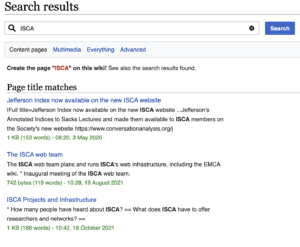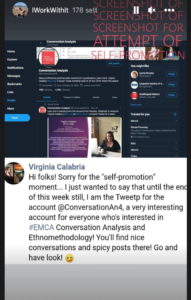Virginia Calabria & Sophia Fiedler
The International Society for Conversation Analysis, aka @ISCAupdates on twitter, @ISCA on Mastodon, with groups on Facebook and LinkedIn is an inclusive community with a global outreach.
Wherever people study #everythingILEMCA, they are part of the ISCA community. ISCA organises international conferences and events, offers resources and tools for member and non-members, e.g., the awesome https://emcawiki.net/Main_Page, where you can keep updated your publication record but also be in the loop of your colleagues’ publications: input a keyword to know what’s out there on the subject –>

The ISCA community welcomes members at all stages of their career, creating in this way bridges between the most experienced scholars in the discipline(s) and the early career researchers (ECRs), who often fear not knowing what’s out there for them! One tool ISCA actively deploys to reach out and get people informed and involved is social media. With three active platforms, managed by volunteers, ISCA is out there in the wild web! But where exactly? You’ll find us:
1) On Twitter as: @ISCAupdates,
2) On Facebook as ISCA – International Society for Conversation Analysis,
3) On Mastodon at @isca@fediscience.org on Mastodon, and
4) The International Society for Conversation Analysis on LinkedIn.


With this piece, we don’t only want to inform or remind you of the social media presence of ISCA, but we also want to call and invite everyone interested in the ISCA community to actively engage in the social media life of the community! How so? We would like to reach out to ECRs (and not only), to hand over for a week the channels allowing you to post in your own time-zone and, if you want, also in your language as well as in English.
Our idea is inspired by Celia Kitzinger’s now closed @EMCA4ll twitter page which invited ECRs to take over a CA page she managed and be the guest Twitter for a week. You’d be invited to tweet about yourself, make your work known, engage with the community: all of a sudden you belonged, you got new followers and people to follow, who you would happen to find at conferences later: it was very exciting!

After this page closed, a great experience, an important precedent, and most of all, some very useful tips on social media use remained:
The EMCA4all project developed 12 very useful principles for social media for scholarly networks, which we share here with kind permission:
1) Be you! Relax about “how-to-do-this” and be yourself: let your individuality come through in your posts, even when posting about a specific topic or for a society…
2) Focus on the topics-at-hand: be it Conversation Analysis, or Ethnomethodology, or Interactional Linguistics. This does not mean that some content that is tangentially related to these topics cannot slip in every once in a while. However, the social media of a community is not the space in which posting purely personal views and completely unrelated things to what the community is about.
3) Use a variety of resources
• Link: “Great article by Schegloff on confirming allusions here: [link]”
• Image: “Conversation analysts at dinner on Conference Day 1 [image]”
• Quote: “’Why that now?’ is key conversation analysis question, says Heritage”
• Repost: (When you just hit RT on someone else’s tweet) – it’s polite to do this if they’ve tagged you.
• Original comment: “Excited to have arrived at Conference Venue – can’t wait to hear opening Keynote by….”
• Reply: (When you respond to someone else’s tweet)
4) Encourage Dialogue: bear time zones in mind – you might want to think about when the most likely time is to get engagement!
5) Be courteous: be kind and… this does not need further comments! 😉
6) Use Hashtags: e.g., #EMCA #ISCA #ILEMCA #LSI #multimodality #academictwitter
7) Include twitter handles in your tweet: so that accounts will be notified that you have sent a tweet concerning them, e.g., “Check out the latest publication on @rolsi_journal”, “New data session at @CASessionsSouth, come join!”, etc.
8) Use Photos: they can really help engagement. But make sure you have licences , personal permission and rights to use the images you want!
9) Add Value: don’t just post something saying: “X is giving a talk about Y”. Make your post more interesting by including links to speaker’s publications or webpages when posting about their talks, saying something that you’re finding interesting about their talk, or report a key finding.
10) Be proactive: if you’re not getting much engagement, remind your friends and colleagues to help out. –> We do like this one here!!! <–
11) Reposts everything that comes in via ‘Notifications’ that is appropriate!
12) Prepare a bit in advance: look at what others have posted in the page before, look at what people engaged in the community posts about events, job offers, etc. and create material. Also schedule your posts using https://buffer.com/ 😉
Not only are these guidelines (which we have just a bit simplified here) super useful, but they also offer us the possibility to show you that it is easy and exciting to get involved! Our intention is to open up the social media platforms to more people so that we can all use it as a tool for engagement but also for getting to know the global #EMCA community. We think this would really give justice to the linguistically and time-zone diversity, which constitute the best part of the global scope of ISCA. So, if after reading this call and the guidelines, you think you’d like to be more involved, you’d like your research group to get more visibility, you are attending an event you’d like to live-tweet about: please get in contact with us on one of the 3 above-mentioned platforms! Wherever you are in the world, and your career: get in touch to be involved or just to send out ideas and strategies that you prefer others taking care of. We’re open to suggestions and encourage engagement and collaboration: this is your space to share too!

Lovely to see this idea being taken forward by a new generation of inspired and dedicated conversation analysts. Enjoy! (Meanwhile I’ve moved on to other things, so if you’re interested in the justice system – in particular how the civil courts make decisions on behalf of people with disabilities that prevent them from making capacitous decisions for themselves) check out our website!)